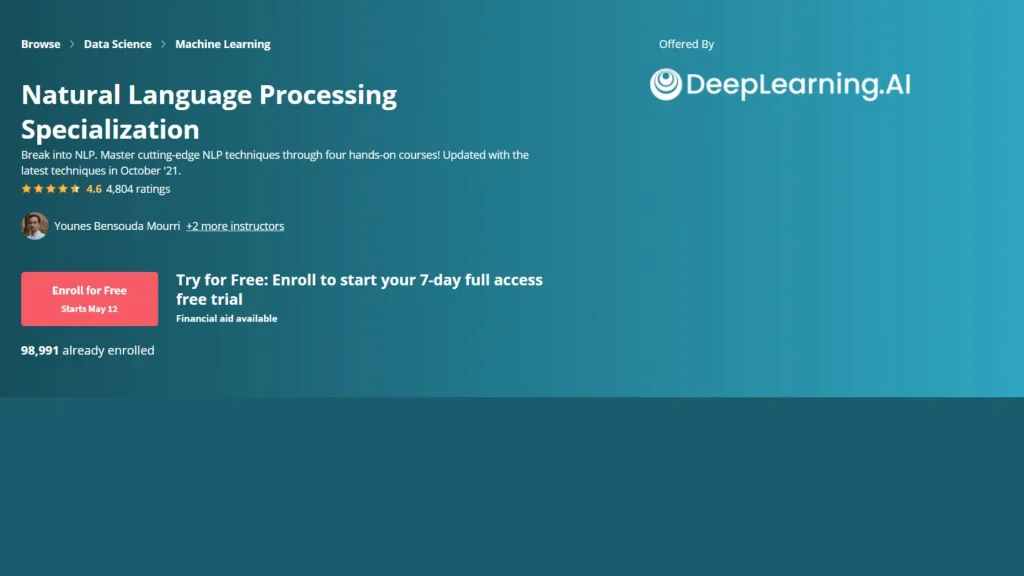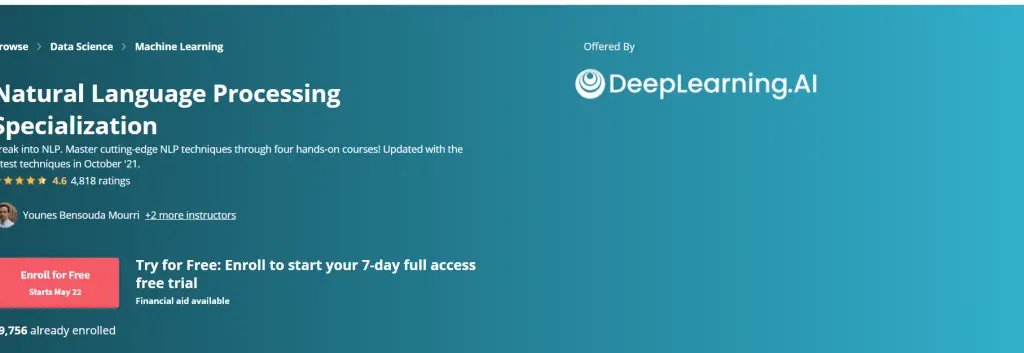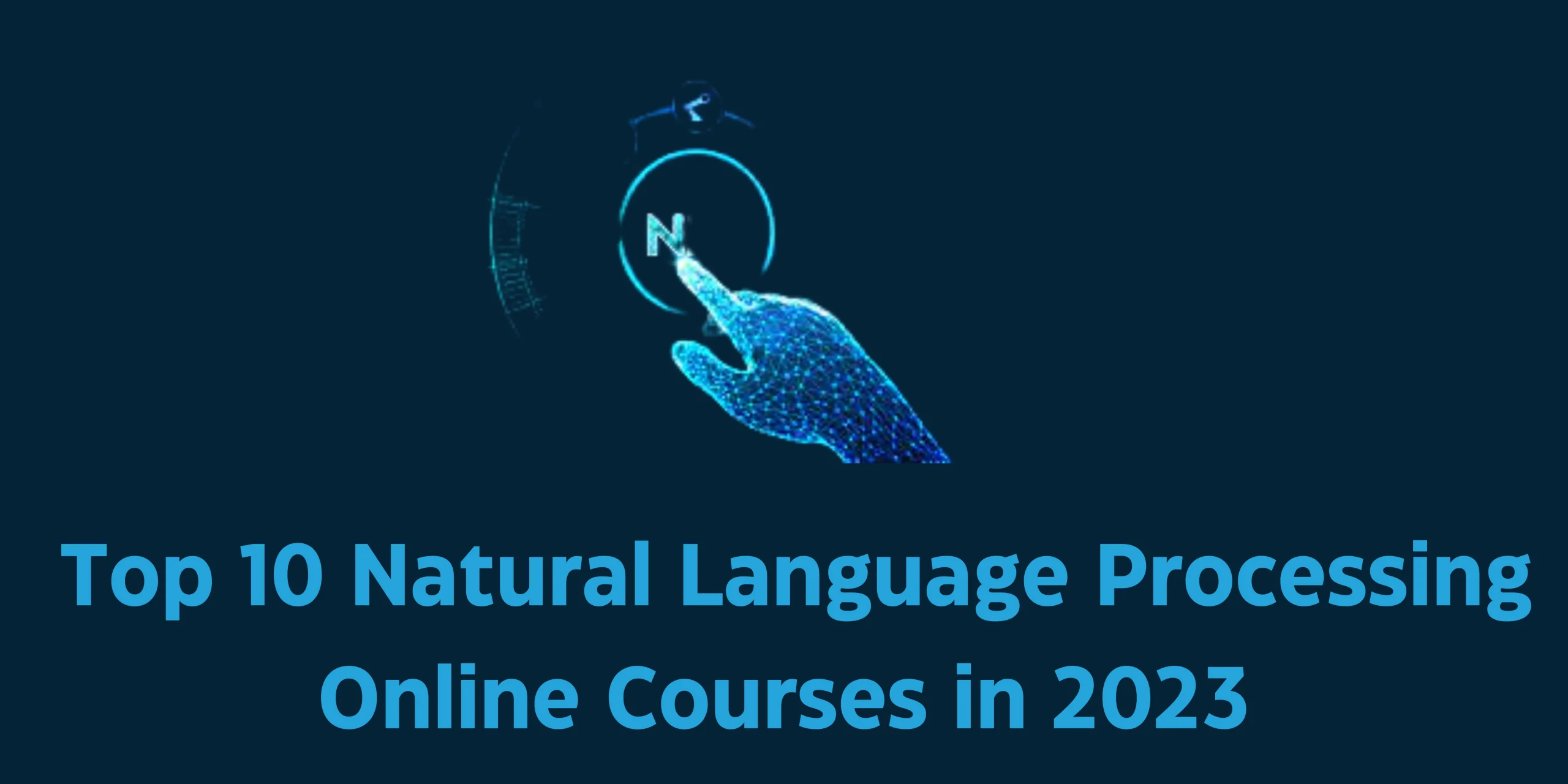In 2023-2024, there are Top 10 Natural Language Processing Online Courses in 2023 (NLP), a subfield of artificial intelligence focused on text and speech understanding. These courses cover a wide range of topics, including computational linguistic functionalities, machine learning, and deep learning techniques. Students can learn about machine-based translations, language translation, and how NLP is applied in various industries such as automotive, electronics, e-commerce, and more.
The practical experiences gained through these courses provide students with the skills to develop intelligent solutions like GPS systems, intelligent driving assistance, digital assistants, speech-to-text systems, chatbots, automated grammar correction tools, and sentiment analysis. With the increasing demand for AI-powered applications, mastering NLP opens up exciting opportunities for individuals to contribute to the advancement of technology and make a positive impact in different sectors.
List Of Top 10 Natural Language Processing Online Courses
best nlp natural language processing free listed below:
1#Natural Language Processing Specialization
Website: https://www.coursera.org/specializations/natural-language-processing
It’s one of the Top 10 natural language processing courses free.NLP uses algorithms to interpret and manipulate human language, making it a critical area of machine learning. This Specialization teaches how to design NLP applications, such as chatbots and sentiment analysis tools, and is taught by experts in NLP, machine learning, and deep learning. By mastering NLP, you’ll be ready for the coming AI-powered future.

2# Deep Learning Specialization
Website: https://www.coursera.org/specializations/deep-learning
The Deep Learning Specialization teaches you to build and train neural networks like CNNs, RNNs, LSTMs, and Transformers using Python and TensorFlow. You’ll learn strategies like Dropout and BatchNorm and apply them to real-world applications like speech recognition and natural language processing. Gain career advice from deep learning experts and level up your AI skills.

3# Machine Learning Specialization
Website: https://www.coursera.org/specializations/machine-learning-introduction
The Machine Learning Specialization is a beginner-friendly online program that teaches the fundamentals of machine learning and how to build real-world AI applications. It is taught by AI expert Andrew Ng and covers supervised and unsupervised learning.

4#Applied Natural Language Processing
Website: https://www.edx.org/search?q=Applied+Natural+Language+Processing
This natural language processing course online is offered by edX and is taught by Nitin Indurkhya, a Professor of Computer Science and Engineering at the University of New South Wales. The course covers topics such as language modeling and machine translation.

5#NLP – Zero to Hero
Website: https://www.udemy.com/course/practical-natural-language-processing-go-from-zero-to-hero/
This course is offered by Udemy which also offers best nlp courses for beginners and is taught by Abhishek Kumar, a data scientist with over 6 years of experience. The course covers topics such as text cleaning and preprocessing.
6#Natural Language Processing Specialization
Website: https://www.coursera.org/specializations/natural-language-processing
This course is offered by Coursera and is taught by professors from the University of Illinois at Urbana-Champaign. The specialization covers topics such as sequence models and attention models.
7#Text Mining and Analytics
Website: https://www.edx.org/course/text-mining-and-analytics
This course is offered by edX and is taught by Chandan K. Reddy, an Associate Professor in the Department of Computer Science and Engineering at Virginia Tech. The course covers topics such as sentiment analysis and topic modeling.
8#Natural Language Processing in TensorFlow
Website: https://www.coursera.org/learn/natural-language-processing-tensorflow
This course is offered by Coursera and is taught by Rajesh Sharma, a Senior Applied Scientist at Amazon. The course covers topics such as tokenization and word embeddings.
9#Natural Language Processing Nanodegree
Website: https://www.udacity.com/course/natural-language-processing-nanodegree–nd892
This course is offered by Udacity and is taught by experts from industry leaders such as Amazon, IBM, and Google. The course covers topics such as text classification and named entity recognition.
10#Machine Learning for NLP
Website:https://www.edx.org/search?q=Machine+Learning+for+NLP
This advanced nlp course is offered by edX and is taught by Ravi Sundaram, a Professor in the Department of Electrical Engineering and Computer Science at Northwestern University. The course covers topics such as language modeling and sentiment analysis.
Recommended Course: best neuro-linguistic programming courses online
Enroll interested in topics: https://www.udacity.com/course/natural-language-processing-nanodegree–nd892
